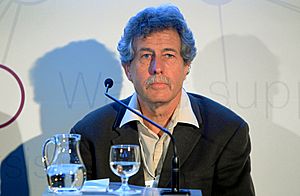Tim Palmer (physicist) facts for kids
Quick facts for kids
Tim Palmer
|
|
|---|---|

Palmer at the World Economic Forum Annual Meeting in Davos 2013
|
|
| Born |
Timothy Noel Palmer
31 December 1952 Kingston upon Thames, Surrey, England
|
| Alma mater |
|
| Awards |
|
| Scientific career | |
| Thesis | Covariant conservation equations and their relation to the energy- momentum concept in general relativity (1977) |
| Doctoral advisor | Dennis William Sciama |
Timothy Noel Palmer, born on December 31, 1952, is a brilliant scientist. He is a mathematical physicist who has spent most of his career studying weather and climate. He focuses on how we can predict them.
Dr. Palmer helped create a special way to predict weather and climate. It's called probabilistic ensemble forecasting. This method uses many different computer models to make predictions. It helps us understand how likely certain weather events are. These techniques are now used all over the world. They help people make important choices for businesses and for helping others.
Contents
Early Life and Education
Tim Palmer was born in Kingston upon Thames, Surrey, England, in 1952. He studied at the University of Bristol. There, he earned a top degree in both Mathematics and Physics. Later, he went to the University of Oxford. He earned his PhD in a complex area of physics called General Relativity Theory.
Research and Discoveries
Dr. Palmer's research looks at how the climate system changes in complex ways. He helped find the world's largest breaking waves. He also suggested a new way to understand how climate change affects different regions. This idea is based on how weather patterns behave.
He was one of the first scientists to suggest that we should use "seamless" models. These models would predict both short-term weather and long-term climate. Since 2016, Dr. Palmer has been working on improving climate models. He uses special math to make them more accurate. He also explores ways to use computers to create very detailed climate models.
Dr. Palmer strongly believes that scientists and countries should work together. By sharing resources, we can build better climate prediction systems. He also studies fundamental physics. He promotes a theory called the "Cosmological Invariant Set Postulate." This theory tries to explain basic principles of physics for both very large and very small things.
Career Highlights
Dr. Palmer became interested in climate science after meeting a geophysicist named Raymond Hide. He then started working at the Met Office, which is the UK's national weather service. He even spent a year working at the University of Washington in the United States.
In 1986, he joined the European Centre for Medium-Range Weather Forecasts (ECMWF). There, he led a new team focused on predicting weather. He helped develop the ECMWF's system for medium-range weather predictions. He also led the creation of the European DEMETER system. This system combines many models to predict seasonal climate.
In 2010, Dr. Palmer became a Professor of Climate Physics at the University of Oxford. This was a special honor from the Royal Society. At Oxford, he also helps lead the Oxford Martin Programme. This program focuses on modeling and predicting climate. He is also a professor at Jesus College, Oxford.
Awards and Honors
Dr. Palmer has received many important awards for his work. He became a Fellow of the Royal Society in 2003. This is a very high honor for scientists in the UK. In 2015, he was made a Commander of the Order of the British Empire (CBE). This award recognized his great contributions to science.
Some of his other awards include:
- World Meteorological Organisation Norbert Gerbier-Mumm International Award (2006)
- American Meteorological Society Carl-Gustaf Rossby Research Medal (2010)
- Institute of Physics Dirac Gold Medal for theoretical physics (2014)
- International member of the American Philosophical Society (2015)
- Honorary Doctor of Science from the University of Bristol (2016)
- International member of the Accademia dei Lincei (2017)
- European Geosciences Union Lewis Fry Richardson Medal (2018)
- Honorary member of the American Meteorological Society (2019)
- International Honorary Member of the American Academy of the Arts and Sciences (2019)
- Honorary Member, Royal Meteorological Society (2020)
- Member of the Foundational Questions Institute (2020)
- International Member of the U.S. National Academy of Sciences (2020)
- Royal Astronomical Society Gold Medal for Geophysics (2023)
- Honorary member, Royal Irish Academy (2023)
The Primacy of Doubt
In October 2022, Dr. Palmer published a book for everyone to read. It's called The Primacy of Doubt. The book explains the science of uncertainty without using complicated math. It talks about how chaos affects weather, climate, and even things like pandemics. It also explores whether quantum uncertainty is different from chaotic uncertainty. Many famous scientists praised the book. Brian Clegg, a popular science writer, called it "quite possibly the best popular science book I've ever read."
See also
- Superdeterminism
 | DeHart Hubbard |
 | Wilma Rudolph |
 | Jesse Owens |
 | Jackie Joyner-Kersee |
 | Major Taylor |

